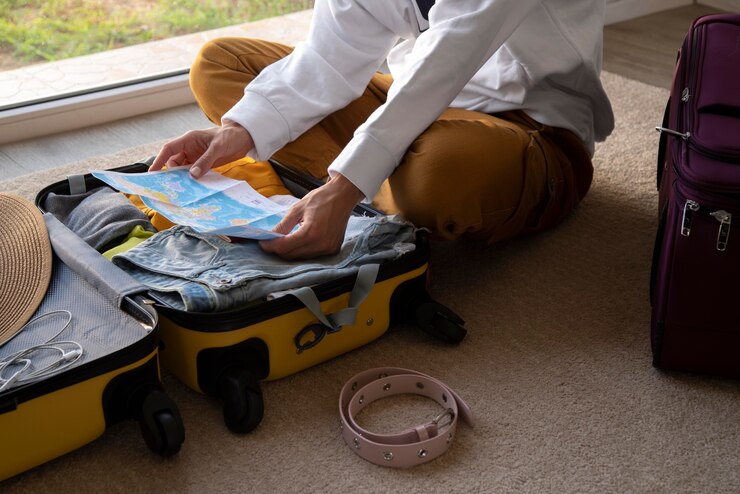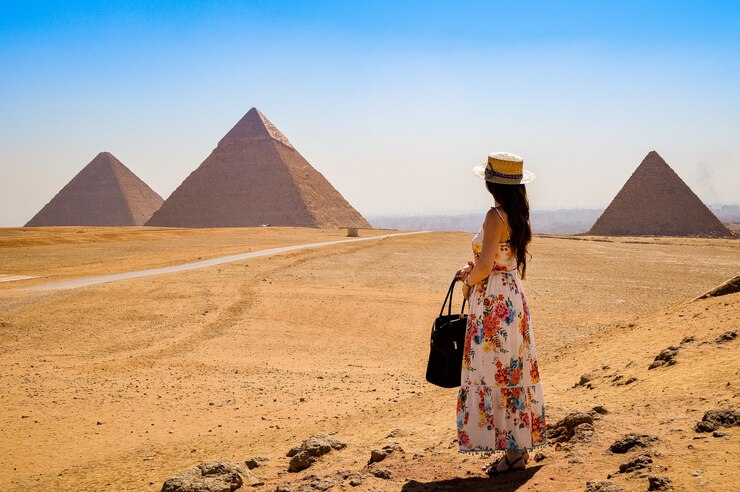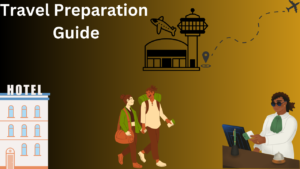Introduction
Egypt, with its rich history, awe-inspiring monuments, and vibrant culture, is a destination that has fascinated travelers for centuries. From the iconic pyramids to the bustling markets of Cairo, Egypt offers a unique and unforgettable experience.
READ 7 Egypt Hidden Gems Beyond the Pyramids
To guarantee a smooth and comfortable trip, as with any destination, there are several activities you should steer clear of. To assist you in getting the most out of your trip, this post will discuss Egypt, travel mistakes, and what not to do in Egypt to help you make the most of your visit.
Pre-Trip Preparations
Visa requirements and travel documentation:

Image by Freepik
Make sure you have all of the required travel paperwork, including your passport and visa. For the most recent details on Egypt’s visa requirements, contact the embassy.
Health Precautions:
Put your health first. For your vacation, find out whether any immunizations are required or advised, and bring any necessary drugs and a first-aid kit.
Banking and currency:

Image by Freepik
Learn about the Egyptian Pound (EGP), the country’s currency. For convenience, it is a good idea to exchange some money before your vacation.
Communication through Language:
Egypt’s official language is Arabic. During your visit, learning a few simple Arabic phrases can be quite helpful.
1. Egypt Travel Mistakes: Ignoring Local Customs and Traditions
The Greeting Ritual: “As-Salamu Alaykum”
When meeting Egyptians, you’ll often hear the greeting “As-Salamu Alaykum,” which means “peace be upon you.” This customary greeting sets the tone for a friendly interaction. Respond with “Wa Alaykum As-Salam” to reciprocate the goodwill.
2. The Art of Accepting Tea or Coffee
Offering tea or coffee is one of Egypt’s most beloved traditions. Accepting this gesture is a display of courtesy and respect, whether you’re at home, in a store, or even in a taxi. It’s a chance to meet locals and exchange stories.
3. Understanding Egyptian Hospitality
Hospitality is at the heart of Egyptian culture. Egyptians take pride in welcoming guests warmly, whether they are family, friends, or strangers. You’ll find that hospitality extends beyond offering drinks; it includes making guests feel comfortable and valued.
4. Dressing Modestly: A Sign of Respect
To show respect for local customs, especially in more conservative areas, it’s advisable to dress modestly. Women should cover their shoulders and knees, and both men and women should avoid revealing clothing when visiting religious sites.
5. Eating Habits and Etiquette
Egyptian food is a beautiful blend of flavors, and eating with others is customary. When dining with locals, make sure to sample the regional cuisine and observe proper dining manners, such as using your right hand to eat and avoiding delicate conversation at the table.
6. Respecting Religious Traditions
Egypt has a significant Muslim population, and it’s important to respect Islamic traditions. During prayer times, avoid loud activities, and dress modestly when visiting mosques.
7. The Role of Family in Egyptian Culture
The family is the cornerstone of Egyptian society. Understanding the importance of family ties and respecting family values will help you connect with locals on a deeper level.
8. Traditional Celebrations and Festivals
Egyptians celebrate various festivals throughout the year. Joining in the festivities and learning about their significance can be a memorable cultural experience.
Egyptians are known for their friendliness, but it’s essential to be mindful of cultural norms when socializing. For example, gender segregation may be observed in certain settings.
10. Egyptian Cuisine: A Culinary Journey
Egyptian food is a revelation for the taste buds. Don’t miss the opportunity to savor dishes like koshari, falafel, and molokhia. Embrace the culinary adventure!
11. Art and Music: A Cultural Expression
Art and music are integral to Egyptian culture. Explore local art galleries and attend traditional music performances to gain a deeper insight into the creative spirit of Egypt.
12. Visiting Ancient Sites: Dos and Don’ts
When exploring Egypt’s ancient wonders, such as the Pyramids and Luxor’s temples, be sure to follow guidelines and show respect for these historical treasures.
13. Shopping in Local Markets
Bargaining is a common practice in Egyptian markets. Engage in friendly negotiations while shopping for souvenirs, and you might just strike a great deal.
14. Transportation and Tipping
Understanding the local transportation options and tipping etiquette will make your travels smoother and more enjoyable.
15. Safety Tips for Travelers
While Egypt is generally safe for tourists, it’s essential to stay informed about current conditions and follow safety guidelines to ensure a worry-free trip.
16. Health and Hygiene Practices
Maintaining good hygiene practices, such as staying hydrated and using sunscreen, is crucial when exploring Egypt’s diverse landscapes.
17. Eco-Friendly Travel in Egypt
Show your commitment to responsible tourism by minimizing your environmental impact and supporting eco-friendly initiatives.
18. Learning Basic Arabic Phrases
Even a few basic Arabic phrases can go a long way in bridging cultural gaps and showing respect for the local language.
19. Responsible Tourism: Leave No Trace
Leave no trace of your visit by disposing of waste responsibly and respecting natural habitats.
20. Common Cultural Misconceptions
Dispelling common myths and misconceptions about Egyptian culture can lead to more meaningful interactions with locals.
21. Cultural Awareness for Businesses
For businesses operating in Egypt, understanding and respecting local customs and traditions is essential for building positive relationships with customers and partners.
22. Cultural Exchange Opportunities
Consider participating in cultural exchange programs or volunteering opportunities to immerse yourself in Egyptian culture.
23. Recommended Reading and Resources
Explore books, websites, and documentaries to deepen your knowledge of Egyptian culture and history.
24. Disregarding Dress Code Etiquette
While Egypt is relatively liberal in terms of dress code, it’s respectful to dress modestly when visiting religious sites or rural areas. Cover your shoulders and knees, and consider wearing a headscarf when necessary.
25. Inappropriate Photography
Taking photos without permission, especially of people, can be considered intrusive. Always ask for permission before capturing someone’s image, and respect their wishes if they decline.
26. Public Displays of Affection
Public displays of affection, such as kissing and hugging, are considered inappropriate in Egypt. Keep physical affection private to avoid discomfort or misunderstandings.
27. Bargaining Aggressively
Haggling is common in Egypt, but bargaining aggressively can be seen as disrespectful. Approach negotiations with a friendly and respectful attitude.
28. Littering and Disrespecting the Environment
Show respect for Egypt’s beautiful landscapes by disposing of trash properly and not disturbing wildlife. Avoid touching or climbing ancient structures.
29. Making Political Remarks
Avoid engaging in political discussions or making critical remarks about Egypt’s government. These topics can be sensitive, and it’s best to steer clear of them.
30. Disregarding Traffic Rules
Egyptian traffic can be chaotic, but it’s essential to follow local traffic rules to ensure your safety and the safety of others.
31. Touching or Pointing with Feet
Feet are considered the lowest part of the body, and pointing them at people or religious objects is disrespectful. Be mindful of your gestures.
32. Drinking Tap Water
Avoid drinking tap water in Egypt, as it may not be safe for tourists. Stick to bottled water to prevent stomach issues.
33. Assuming Everyone Speaks English
While English is widely spoken in tourist areas, it’s courteous to learn a few basic Arabic phrases to facilitate communication and show respect for the local language.
34. Dismissing Street Food
Egyptian street food is a culinary delight, but some tourists may be hesitant to try it. Don’t miss out on these delicious treats; just make sure to choose reputable vendors.
35. Failing to Respect Personal Space
Respect personal space and avoid standing too close to locals. Egyptians value their personal space, and it’s important to be mindful of this.
36. Summary
Key Takeaways
When visiting Egypt, it’s essential to be aware of cultural sensitivities and customs. Here are the key takeaways from our guide on what not to do in Egypt:
- Respect Local Traditions: Familiarize yourself with Egyptian customs and traditions to show respect for the local culture.
- Dress Modestly: Dress modestly, especially when visiting religious sites or rural areas, by covering your shoulders and knees.
- Seek Permission for Photos: Always ask for permission before taking photos, particularly of people, to avoid intrusiveness.
- Respect Religious Sites: Remove your shoes, cover your head (if you’re a woman), and be respectful when entering religious sites.
- Keep Affection Private: Avoid public displays of affection, as they are considered inappropriate in Egyptian society.
- Negotiate Respectfully: When bargaining, maintain a friendly and respectful attitude to avoid appearing aggressive.
- Preserve the Environment: Dispose of trash properly and refrain from touching or climbing ancient structures.
- Tip Appropriately: Follow local tipping customs to acknowledge the hard work of service workers.
- Avoid Political Discussions: Steer clear of political discussions and critical remarks about the government to prevent sensitive situations.
- Follow Traffic Rules: Adhere to local traffic rules for your safety and the safety of others.
- Mind Gestures: Be mindful of gestures involving your feet, as they can be considered disrespectful.
- Drink Bottled Water: Refrain from drinking tap water and opt for bottled water to prevent stomach issues.
- Learn Basic Arabic Phrases: Learning a few basic Arabic phrases can enhance communication and show respect for the local language.
- Try Street Food: Don’t miss the chance to savor delicious Egyptian street food, but choose reputable vendors.
- Respect Personal Space: Be mindful of personal space and avoid standing too close to locals.
Conclusion
Egypt is a land of beauty, history, and vibrant culture. To have a fulfilling and respectful experience while visiting this enchanting country, it’s crucial to avoid cultural missteps. By following these guidelines and showing respect for local customs and traditions, you can make the most of your trip to Egypt and leave a positive impression.
FAQs
1. Is it safe to travel to Egypt?
Egypt is generally safe for tourists, but it’s essential to stay informed about the current situation and follow local guidelines and recommendations.
2. Can I wear shorts in Egypt?
While shorts are acceptable in tourist areas, it’s advisable to dress modestly when visiting religious sites or rural areas.
3. What currency is used in Egypt?
The official currency of Egypt is the Egyptian Pound (EGP).
4. Is it customary to tip in Egypt?
Yes, tipping is accepted and valued by service providers in Egypt.
5. What should I do if I get sick while in Egypt?
If you become ill, seek medical attention and contact your embassy or consulate for assistance.





